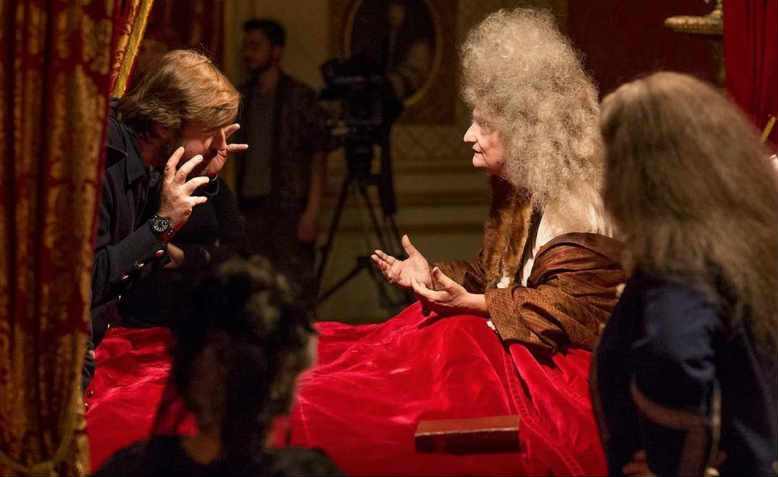 Albert Serra directs Jean-Pierre Léaud as the Sun King in The Death of Louis XIV. Photo: Capricci Films
Albert Serra directs Jean-Pierre Léaud as the Sun King in The Death of Louis XIV. Photo: Capricci Films
Tom Lock Griffiths locates a unique performance at the heart of Albert Serra’s study of aristocratic and corporeal decay
The Death of Louis XIV, the latest work from Catalan director Albert Serra, spans – often in unsparing detail – the last twenty-four days of the French monarch Louis (1638–1715) as he succumbs to gangrene. Louis XIV reigned for an incredible 72 years from 1643 until his death in 1715. The ‘Sun King’ as he became known, probably at his own contrivance, was the living embodiment of the Ancien Régime in France. The Ancien Régime was the height of feudal absolutism in Western Europe, until it was dramatically and world-historically toppled by the French Revolution in 1789.
Louis is famous, among other things, for revamping his father’s (Louis XIII) hunting lodge into the Palace of Versailles, which became the centre for the new cult of the Sun King and all the immense ritual that attended it.
Much of this, along with his constant maneuvering in his early years to consolidate his absolute control is captured well in the current BBC Drama Versailles, starring a young and handsome George Blagden, a strutting amorous peacock, convinced of his own Divine Right to rule absolutely.
Serra’s casting of Jean-Pierre Léaud for the end of Louis’ life is a stroke of genius, as it’s easy, either from memory or a quick google search, to see the young golden boy of the French New Wave in his prime, being dashing, energetic, and desirable. Léaud’s career is not quite as long, but it still exceeds a huge 58 years, quite remarkable for an actor who was once so prized for his youth and vitality.
Privilege
Since, 1959’s The 400 Blows, the breakthrough film by Francois Truffaut, he has stared in over 40 films, working along side many greats of cinema including, Jean-Luc Godard, Olivier Assayas, Jacques Rivette, Pier Paolo Pasolini and many more.
Watching this young lion turned old man, ravaged by time and excess, struggling to get out of bed, hold down food, waking drenched with sweat in the night, as his leg turns black and he slowly withdraws into himself is often hard viewing. It is captivating nonetheless and despite the almost unique life of privilege and wealth he enjoyed, by casting Léaud, Louis becomes the universal dying man/woman, the personification of the end we all know is coming.
Surprisingly the film works best when we’re just left to observe this fine performance, and performance it is, as Louis’ court crowds round to applause his eating of a small amount of broth and biscuits and hangs on his every gesture and nod of assent. Unfortunately the film does start to drag, but not in these long takes of not much at all happening as you might expect, but as director Serra starts to lose his nerve and begins to enforce a little more gratuitous narrative and a little more action.
Swarm
As the focus shifts away from Louis, as the sunlight starts to dim, the film becomes more preoccupied with the intrigues of the doctors and quacks that swarm and hover at his bedside, all too late in the day, shifting our attention onto the details, and limitations, of Eighteenth Century medical science.
As this happens, and Léaud takes on a more passive role, the film starts to lose its universal power. That said, it is strikingly beautiful in its production design and performances, but it is the quiver of an old man’s cheek and his enfeebled hands, that will haunt the viewer, while the mini-drama played out by Louis’ attendants will fade.

